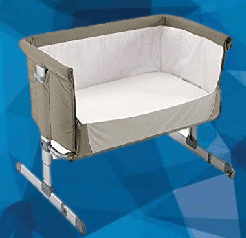How to Help Your Newborn Sleep Better: 3 Simple Steps!!
Parents of a newborn baby must deal with the difficulties associated with getting the baby to sleep on a nightly basis. Getting a good night of sleep can be difficult when you have to get up out of bed and walk over to the crib to comfort your crying child. Of course, all the time and lost sleep is worth it in order to help your growing infant, but getting a little bit of a better night sleep for both you and your newborn can be simple with a few easy steps.
Sleep is a quintessential factor in the growth and development of a healthy baby. Getting enough sleep can have long-term benefits for a baby’s memory and brain development. Sleep is when blood supply to the muscles increases, allowing for tissue growth and important hormone release during the rapid eye movement (REM) phase of sleep.
-
Co-Sleeping Cribs
One of the easiest ways to improve sleep quality for both your newborn and yourself is through the use of a co-sleeping crib. Many advise against allowing your newborn to share the bed with you. There are serious concerns and risks associated with this choice. But new parents do not want to be far from the baby in case of an emergency during the night or in case the baby wakes and needs to be comforted back to sleep.
 Having to get up out of bed and walk across the room to comfort baby in their crib takes time and can lead to a more interrupted night of sleep. It can make getting back to sleep difficult. This is why co sleeping beds are great. The co sleeping bed is a small crib that attaches to the larger bed. This means the baby can sleep soundly right next to you, without being affected by the possible dangers of sharing a bed.
Having to get up out of bed and walk across the room to comfort baby in their crib takes time and can lead to a more interrupted night of sleep. It can make getting back to sleep difficult. This is why co sleeping beds are great. The co sleeping bed is a small crib that attaches to the larger bed. This means the baby can sleep soundly right next to you, without being affected by the possible dangers of sharing a bed.
It is a great option for parents who are nursing or parents who want their baby to benefit from proximity while sleeping. The baby is in their own crib, but parents can reach out and see, smell, and touch baby during the night safely, and quickly provide comfort or support immediately whenever the baby needs it during the night.
-
Use Lighting Strategically
Keep rooms light with sunlight during the day, even during naps. Many parents have found that unless their baby needs dimmer rooms to go to sleep, this use of light during daytime naps makes it easier to fall asleep at night. Experts recommend beginning to dim the lights around two hours before sleep time. This sets the mood and allows the baby’s natural instincts to adjust to the change in mood and to begin preparing for sleep.
If baby wakes up during the night, the most strategic choice is to leave the lights off and continue to in the dark. Turning on the lights triggers a biological response to wake up. Investing in shades is also a great idea as babies may be woken up by bright sunlight in the morning. Keeping the room dark later in the morning may lead to longer, deeper sleep uninterrupted by the sun rising.
-
Let Your Baby Self-Soothe
While it may be instinctual to run to the baby as fast as possible when they begin to cry during the night, sometimes the best choice is to give them a minute to see if they can calm themselves down. Waiting for them to calm down by themselves can be a great tool to teach them to sleep through the night.
If the baby doesn’t begin to calm down and the crying grows more and more, it is important to step in before the baby has worked him or herself up too much to be soothed back to sleep. Giving the baby a few moments though before stepping in can teach them the skills to self-soothe during the night and get better, longer nights of sleep.
